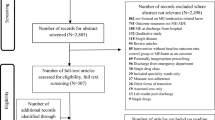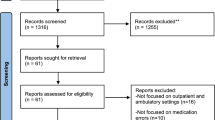Abstract
Patients with comorbid mental health and chronic conditions often receive care from both psychiatrists and primary care physicians (PCPs). The introduction of multiple providers into the care process introduces opportunities for disruptions in care continuity. The purpose of this study was to explore psychiatrists’ and PCPs’ comfort prescribing, along with their comfort having other physician specialties prescribe medications for cardiometabolic, psychiatric, and neurological/behavioral conditions. This cross-sectional study utilized an online, validated, pilot-tested, anonymous survey to examine prescribing practices of psychiatrists and PCPs. Eligible participants included physicians with medical degrees, U.S. prescribing authority, and active patient care for ≥2 days/week. Outcomes of interest were physicians’ self-comfort and cross-specialty comfort (other specialists prescribing mutual patients’ medications) prescribing cardiometabolic, psychiatric, and neurological/behavioral medications. Comfort prescribing was measured using 7-point Likert scales. Discrepancies in comfort were analyzed using student’s, one-sample, and paired t-tests. Multiple linear regressions examined associations between physician practice characteristics and physicians’ comfort-level prescribing cardiometabolic and psychiatric medication categories. Among 50 psychiatrists and 50 PCPs, psychiatrists reported significantly lower self-comfort prescribing cardiometabolic medications (mean ± SD = 2.99 ± 1.63 vs. 6.77 ± 0.39, p < 0.001), but significantly higher self-comfort prescribing psychiatric medications (mean ± SD = 6.79 ± 0.41 vs. 6.00 ± 0.88, p < 0.001) and neurological/behavioral medications (mean ± SD = 6.48 ± 0.74 vs. 5.56 ± 1.68, p < 0.001) than PCPs. After adjusting for covariates, physician specialty was strongly associated with self-comfort prescribing cardiometabolic and psychiatric medication categories (both p < 0.001). Differences between self-comfort and cross-specialty comfort were identified. Because comfort prescribing medications differed by physician type, incorporating psychiatrists through collaborative methods with PCPs could potentially ensure comfort among physicians when initiating medications.
Similar content being viewed by others
Data Availability
Individual requests should be sent to the corresponding author.
References
Clyne B, Cooper JA, Hughes CM, Fahey T, Smith SM. 'Potentially inappropriate or specifically appropriate?' qualitative evaluation of general practitioners views on prescribing, polypharmacy and potentially inappropriate prescribing in older people. BMC Fam Pract. 2016;17:1–9.
Druss BG, Walker ER. Mental disorders and medical comorbidity. The Robert Wood Johnson Foundation; Research Synthesis Report No. 2011: ISSN 2155–3718. 2011.
Druss BG, Bradford WD, Rosenheck RA, Radford MJ, Krumholz HM. Quality of medical care and excess mortality in older patients with mental disorders. Arch Gen Psychiatry. 2001;58(6):565–72.
Salsberry PJ, Chipps E, Kennedy C. Use of general medical services among Medicaid patients with severe and persistent mental illness. Psychiatr Serv. 2005;56(4):458–62.
Lambert TJ, Newcomer JW. Are the cardiometabolic complications of schizophrenia still neglected? Barriers to care. Med J Aust. 2009;190(S4):S39–42.
Cullinan S, Raae Hansen C, Byrne S, O'Mahony D, Kearney P, Sahm L. Challenges of deprescribing in the multimorbid patient. Eur J Hosp Pharm. 2017;24(1):43–6.
Ong MS, Olson KL, Chadwick L, Liu C, Mandl KD. The impact of provider networks on the co-prescriptions of interacting drugs: a claims-based analysis. Drug Saf. 2017;40(3):263–72.
Ong MS, Olson KL, Cami A, Liu C, Tian F, Selvam N, et al. Provider patient-sharing networks and multiple-provider prescribing of benzodiazepines. J Gen Intern Med. 2016;31(2):164–71.
National Institute of Mental Health. Mental Illness. https://www.nimh.nih.gov/health/statistics/mental-illness.shtml#part_154785. Published 2019. Accessed March 17, 2020.
SSantillanes G, Axeen S, Lam CN, Menchine M. National trends in mental health-related emergency department visits by children and adults, 2009–2015. Am J Emerg Med. 2019.
Olfson M, Wang S, Wall M, Marcus SC, Blanco C. Trends in serious psychological distress and outpatient mental health care of US adults. JAMA Psychiatry. 2019;76(2):152–61.
Pincus HA, Tanielian TL, Marcus SC, Olfson M, Zarin DA, Thompson J, et al. Prescribing trends in psychotropic medications: primary care, psychiatry, and other medical specialties. JAMA. 1998;279(7):526–31.
National Institute of Mental Health. Mental Health Medications. https://www.nimh.nih.gov/health/topics/mental-health-medications/index.shtml. Published 2016. Accessed March 17, 2020.
Mojtabai R, Olfson M. National trends in psychotropic medication polypharmacy in office-based psychiatry. Arch Gen Psychiatry. 2010;67(1):26–36.
Kantor ED, Rehm CD, Haas JS, Chan AT, Giovannucci EL. Trends in prescription drug use among adults in the United States from 1999-2012. JAMA. 2015;314(17):1818–31.
Mojtabai R, Olfson M. Proportion of antidepressants prescribed without a psychiatric diagnosis is growing. Health Aff (Millwood). 2011;30(8):1434–42.
Maust DT, Blow FC, Wiechers IR, Kales HC, Marcus SC. National Trends in antidepressant, benzodiazepine, and other sedative-hypnotic treatment of older adults in psychiatric and primary care. J Clin Psychiatry. 2017;78(4):e363–71.
Rhee TG, Rosenheck RA. Initiation of new psychotropic prescriptions without a psychiatric diagnosis among US adults: rates, correlates, and national trends from 2006 to 2015. Health Serv Res. 2019;54(1):139–48.
Fraser K, Oyama O. Knowledge of psychotropics and prescribing preferences of family physicians: a preliminary study. Acad Psychiatry. 2013;37(5):325–8.
Rashid A, Llanwarne N, Lehman R. Prescribing for ADHD in primary care. Br J Gen Pract. 2018;68(669):170–1.
Ostbye T, Yarnall KS, Krause KM, Pollak KI, Gradison M, Michener JL. Is there time for management of patients with chronic diseases in primary care? Ann Fam Med. 2005;3(3):209–14.
Maciejewski ML, Hammill BG, Voils CI, et al. Prescriber continuity and medication availability in older adults with cardiometabolic conditions. SAGE Open Med. 2018;6:2050312118757388.
Maciejewski ML, Hammill BG, Bayliss EA, Ding L, Voils CI, Curtis LH, et al. Prescriber continuity and disease control of older adults. Med Care. 2017;55(4):405–10.
Hansen RA, Voils CI, Farley JF, Powers BJ, Sanders LL, Sleath B, et al. Prescriber continuity and medication adherence for complex patients. Ann Pharmacother. 2015;49(3):293–302.
Ploeg J, Yous ML, Fraser K, Dufour S, Baird LG, Kaasalainen S, et al. Healthcare providers' experiences in supporting community-living older adults to manage multiple chronic conditions: a qualitative study. BMC Geriatr. 2019;19(1):316.
Schreiner A, Simpson K. Primary care and chronic disease: the intersection of comfort and specialty involvement - a cross-sectional study. J Eval Clin Pract. 2017;23(3):494–7.
Chou C, Hohmann NS, Hastings TJ, et al. How comfortable are primary care physicians and oncologists prescribing medications for comorbidities in patients with cancer? Res Social Adm Pharm. 2020;16(8):1087–1094.
Qualtrics. Panel management software. https://www.qualtrics.com/research-core/panel-management/ Accessed 28 Mar 2019.
Young AS, Klap R, Sherbourne CD, Wells KB. The quality of Care for Depressive and Anxiety Disorders in the United States. Arch Gen Psychiatry. 2001;58(1):55–61.
Weisberg RB, Dyck I, Culpepper L, Keller MB. Psychiatric treatment in primary care patients with anxiety disorders: a comparison of care received from primary care providers and psychiatrists. Am J Psychiatry. 2007;164(2):276–82.
Seaman JJ, Cornfield RM, Cummings DM, Peterson CW, Lyon J. Exploring psychiatric prescribing practices: the relationship between the role of the provider and the appropriateness of prescribing. Gen Hosp Psychiatry. 1987;9(3):220–4.
Wake L-A, Balon R. Should psychiatrists prescribe nonpsychotropic medications? Curr Psychiatr Ther. 2019;18:52–6.
Chang LS, Vaduganathan M, Plutzky J, Aroda VR. Bridging the gap for patients with diabetes and cardiovascular disease through Cardiometabolic collaboration. Curr Diab Rep. 2019;19(12):157.
Colorafi K, Vanselow J, Nelson T. Treating anxiety and depression in primary care: reducing barriers to access. Fam Pract Manag. 2017;24(4):11–6.
Curkovic M, Dodig-Curkovic K, Eric AP, Kralik K, Pivac N. Psychotropic medications in older adults: a review. Psychiatr Danub. 2016;28(1):13–24.
Boyd C, Smith CD, Masoudi FA, Blaum CS, Dodson JA, Green AR, et al. Decision making for older adults with multiple chronic conditions: executive summary for the American Geriatrics Society guiding principles on the Care of Older Adults with Multimorbidity. J Am Geriatr Soc. 2019;67(4):665–73.
Acknowledgements
The authors acknowledge Dr. Marisa Elena Domino at University of North Carolina at Chapel Hill, Gillings School of Global Public Health, Department of Health Policy and Management, and Dr. Matthew L. Maciejewski at Duke University, School of Medicine for their contributions in the process of completing the study.
Funding
This work was supported by the Auburn University Research Initiative in Cancer (AURIC), but investigator time was not supported. The sponsor of this study played no role in the design and conduct of the study; in the collection, analysis, and interpretation of the data; or in the preparation, editing, or censuring of the manuscript.
Author information
Authors and Affiliations
Contributions
Funding acquisition and study conceptualization were completed by Hansen. Data collection, data analysis and interpretation were performed by Chou, McDaniel, Abrams, Farley, and Hansen. Chou supervised the formal investigation. The first draft of the manuscript was written by McDaniel and all authors commented on, reviewed, and edited previous versions of the manuscript thoroughly. All authors read and approved the final manuscript.
Corresponding author
Ethics declarations
Conflict of Interest
The authors declare that they have no conflict of interest.
Ethics Approval
The study protocol was approved by Auburn University’s Institutional Review Board.
Consent to Participate
Initiation of the anonymous survey justified as informed consent.
Consent for Publication
Initiation of the anonymous survey justified as informed consent.
Code Availability
Individual requests should be sent to the corresponding author.
Previous Presentation
Findings were presented at the American Association of Colleges of Pharmacy (AACP) Annual Meeting in July 2020.
Additional information
Publisher’s Note
Springer Nature remains neutral with regard to jurisdictional claims in published maps and institutional affiliations.
Rights and permissions
About this article
Cite this article
Chou, C., McDaniel, C.C., Abrams, J.D. et al. An Examination of Prescribing Responsibilities between Psychiatrists and Primary Care Providers. Psychiatr Q 92, 587–600 (2021). https://doi.org/10.1007/s11126-020-09828-0
Published:
Issue Date:
DOI: https://doi.org/10.1007/s11126-020-09828-0




